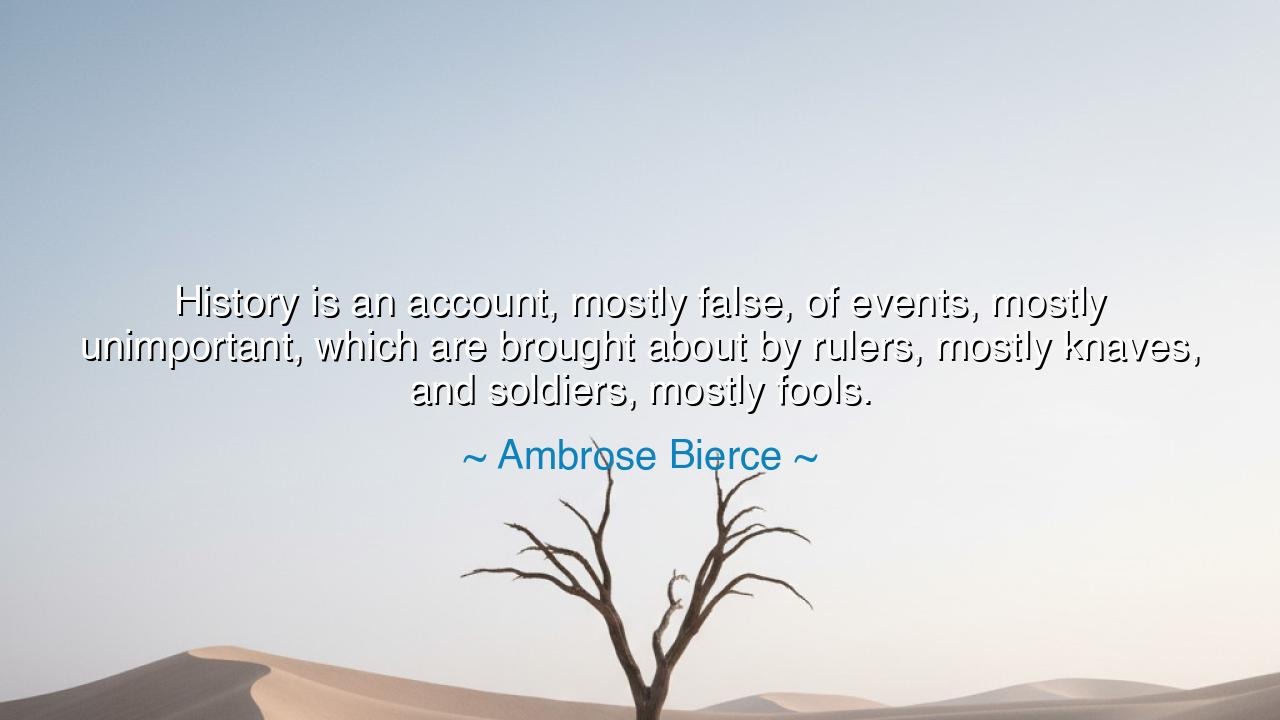
History is an account, mostly false, of events, mostly
History is an account, mostly false, of events, mostly unimportant, which are brought about by rulers, mostly knaves, and soldiers, mostly fools.






“History is an account, mostly false, of events, mostly unimportant, which are brought about by rulers, mostly knaves, and soldiers, mostly fools.” Thus spoke Ambrose Bierce, the darkly brilliant writer whose pen cut through illusion like a blade through silk. His words are both bitter and illuminating, filled with the sharp irony of a man who had seen the face of war and the frailty of power. This quote, drawn from the caustic pages of his Devil’s Dictionary, is not the utterance of a cynic without faith — but of a realist who has seen how the story of history is often written not by the wise or the just, but by the victors, the corrupted, and the deceived. Bierce reminds us that what we call history is not always truth, but the echo of power reverberating through time.
To the ancients, such wisdom would not have been strange. The historian Thucydides, who chronicled the Peloponnesian War, too confessed that truth is often bent to the will of those who command armies and control the tongue of record. The rulers, in their pride, cloak their ambitions in noble words; the soldiers, in their zeal or ignorance, obey without question; and the people, when the dust settles, receive a tale sculpted from half-truths. Thus, Bierce’s words are not merely mockery — they are revelation. He pulls aside the veil of grandeur that covers the tragedies of empire and asks us to see history not as a shining tapestry, but as a fabric woven from vanity and folly.
Bierce himself knew of what he spoke. He was no distant scholar, no idle philosopher in his tower — he was a soldier, a survivor of the American Civil War, who had watched men die not for glory, but for orders given by those far removed from the blood and mud of battle. He saw young men march into cannon fire for flags and slogans whose meanings dissolved in the smoke. Later, when he became a writer, his pen refused to flatter the memory of war. He called it what it was: a theater of deception, where courage and ignorance often wore the same face, and where the victors rewrote the script. His bitter laughter in this quote is the laughter of one who has lost faith in the myth of righteous conquest.
And yet, in this darkness, there is a deeper light. Bierce’s condemnation forces us to seek truth for ourselves. If history is “mostly false,” then our duty is not to despair, but to question, to sift through the dust for what is real. The ancients taught that wisdom begins with doubt — gnōthi seauton, “know thyself,” meant not only to know one’s soul, but to know one’s blindness. So too must we know the blindness of history. For what is recorded is often what the powerful wish remembered, and what is forgotten may be what truly mattered. The farmer who fed the starving, the mother who saved a child, the thinker who whispered freedom into the wind — these are rarely written into the scrolls, yet they are the unseen pillars upon which humanity endures.
Consider the First World War, called by many “the war to end all wars.” Millions died in the mud, yet the chronicles written after spoke of glory and valor, of victories and treaties. Only later, through poets and witnesses, did the truth emerge — that it was a conflict born of arrogance, fear, and folly, not of necessity or heroism. Bierce’s words could have been their epitaph: rulers led with deceit, soldiers followed in ignorance, and history dressed their ruin in rhetoric. What survived was not truth, but narrative — a story polished for pride and power.
Thus, Bierce’s cynicism is in fact a mirror, showing us our duty to become better storytellers of the human race. The lesson is not to reject history, but to redeem it. To read between its lines, to challenge its voices, to remember that truth often hides where no historian looks — in the small, the humble, the human. The ancient chroniclers may have written of kings and conquests, but the soul of history lives in those who resisted, questioned, endured.
So, my friend, take heed. Do not worship history as scripture, but treat it as a field to be tilled for understanding. Question the victors. Listen for the silenced. Seek the patterns beneath the words, for that is where wisdom lies. Bierce reminds us that truth is not given; it must be earned, wrestled from the grip of deceit and pride. The past, like the present, is ruled by those who desire control — but the wise man, the awakened one, seeks freedom from illusion.
And remember this: even if history is “mostly false,” its lessons need not be. The errors of the past, when seen clearly, become the light that guides the future. Bierce’s laughter, though bitter, is the laughter of one who sees the truth and survives it. Learn, therefore, not to believe blindly, but to see deeply. For only those who look beyond the written word — beyond the knaves and the fools — will ever glimpse the real story of humankind: a story not of rulers and battles, but of the eternal struggle between ignorance and truth.






AAdministratorAdministrator
Welcome, honored guests. Please leave a comment, we will respond soon